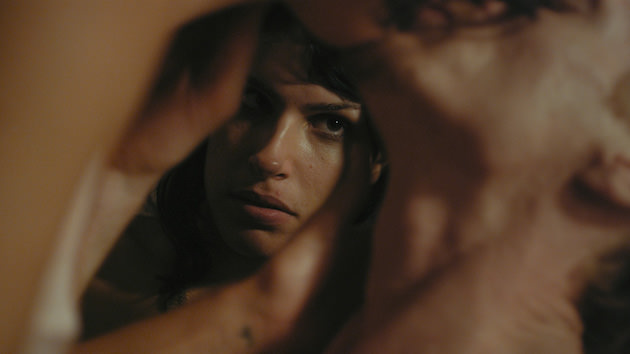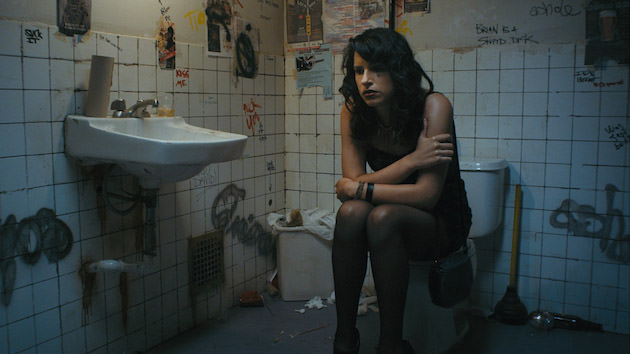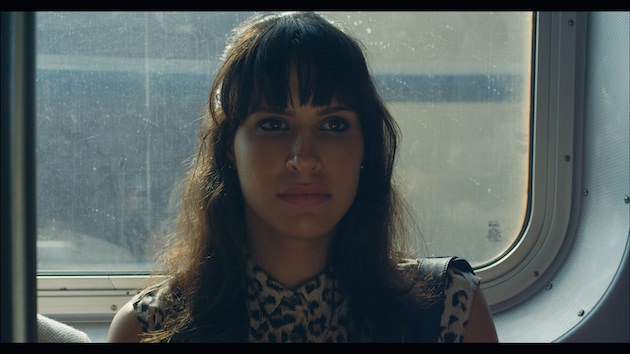A Q&A With Writer, Director & Actress Desiree Akhavan, New Girls Cast Member
Since her feature film debut, Appropriate Behavior, premiered at Sundance in 2014, Desiree Akhavan — the film's 30-year-old writer, director, and star — has been garnering buzz as the "Next Lena Dunham." It's a click-bait headline that grabs eyeballs, for sure, but it's also a lazy person's way of saying that she's an intelligent, funny, moral and sexual boundary-pushing, talented filmmaker who also happens to be a young woman who writes, directs and stars in her own stuff. (But really: Does every young female filmmaker who talks about her body parts and being awkward have to be compared to the Girls creator?) The Dunham comparisons have now reached the meta-stage, as Akhavan was added to the fourth season of Girls as Dunham's classmate at her Iowa writer's workshop.
In her film, Akhavan stars as Shirin, a bisexual Iranian-American who is struggling for acceptance in every area of her life. Her parents don't understand why she won't make like her brother and marry an approved Iranian catch. Her ex-girlfriend is stressing her out, and, like most 20-somethings, she's not sure of herself or her place in the world, either.
Akhavan was born in New York and grew up in New Jersey and later in Rockland County, New York. She studied at Smith college and NYU's Tisch School of the Arts (and also abroad for a year at Queen Mary, University of London); Appropriate Behavior was her senior thesis, born as a short film. She is also the co-creator of the award-winning web series The Slope, which follows a pair of lesbians in Park Slope, Brooklyn. And funnily enough, now that she's playing one of Dunham's classmates on Girls, the comparisons should stop as we can now watch every Sunday how different these two talented young women are.
Appropriate Behavior premiered in New York and Los Angeles this past January 16, and on Video on Demand. We spoke to Akhavan about Annie Hall, dealing with social media bullies, and yes, those Dunham comparisons.
How did you come up with the story?
At the time I started writing this, I was making a web series called The Slope. I always knew I wanted to make the feature version of the show, so it actually started off very differently. I wrote a script that would’ve been very inexpensive to shoot. The Slope inspired me to work within my means and not wait for someone to give me an opportunity, so I was gonna try to shoot a feature for maybe $5,000 with friends. I wrote a script that was 12 scenes that was looking at the rise and fall of a relationship — one day of each month that they were together — in the vein of Scenes from a Marriage. I showed it to friend of mine who’s a producer, Cecelia Frugiuele. She lives in London, so it never seemed likely that we’d work together, but she said, "I think I can raise the financing in the U.K., but why don’t we work together on something that would not just be about this couple but her whole life? Why don’t we incorporate your family?" So we broadened it a bit.
Did you keep any scenes from the original script?
When we went back to the drawing board there were lot of scenes that I loved and still wanted to use, like the New Year’s Eve scenes, and the birthday scene where they break up. But I had all these new scenes that I started writing. I ended up taking a non-linear approach because I’d recently seen Annie Hall, and what I love about that is that you know from the very beginning that they break up. I thought, "If you know this couple is breaking up from the start, could you still love them? Could you still understand?" So that was the challenge. We spent a year rewriting. The first script I wrote in a month, and I spent a year with Cecelia, amongst doing other things, going through the script and rewriting. Then I went to London for three weeks and we worked together to break it down. When I write, I like to act out the scenes out loud, so we would just read all the parts together, and if it felt hard to say out loud to each other, then it had to go. We stayed really close to the script on set.

There’s such a fly on the wall quality to the film.
I think because the script and the lines sometimes are a little bit absurd, we really wanted the execution of it to be realistic and to have two feet on the ground at all times. It was all about getting the most natural performances and throwing away jokes or lines. There are few lines that are improvised–Arian (Moayed), who plays her brother, came up with a couple of really funny zingers once he got the character. He did some really great interrupting and did some lines that I love. By the end of the shoot, he and I kind of figured out that dynamic.
You’ve said that the writing was in the rewriting. Did you scrap entire pages and scenes as you went along?
Yeah. I throw a lot of stuff away. I’m not precious. I write very fast, and then I lose a lot of it. I like to understand why each joke is necessary, if we’re just going off on a tangent, and then you do it again in the editing room. Now that I’ve screened it 100 times, and I’m familiar with every single moment, I can totally see why certain jokes were cut—because we were showing off. We had to figure out: What’s serving the story? What is this saying about our characters? Are we just jerking off here? Is this just trying to impress each other and make each other laugh?

Can you be satisfied now watching the film, or are you always thinking, “That moment could’ve been done differently. That line could’ve been tweaked.”
(laughs) What’s really funny about that is I watched almost every screening at Sundance, I think I watched it five times. And I was so happy with it and satisfied. I didn’t think of anything that should’ve been changed. I thought, “We did it. We really did it.” And that was the most high stakes screening I had, and the most stressful moment of my life, and I was happy. Then months went by and I watched it again in Sydney, and I hated every moment of it. I was like, “Whaaaaat am I doing? This is hell.” Ever since then, I’ve been incapable of watching it. I can’t anymore. I just passed the point of no return. And I think it’s because I’ve watched it so many times, and I had that great closure of premiering it and seeing it in all its glory and feeling good, that now I’ve crossed over to the dark side. There’s no going back. I’m sure that in a couple of years, I’ll be able to enjoy it again.
Will you watch it in theaters?
I wonder. I really wonder. I’m wondering what I’m hoping to get out of that. The Nighthawk [in Williamsburg, Brooklyn] is one of my favorite theaters, so I might go there during the week just to get a sense of what plays there and what doesn’t. But at a certain point, it's like, “What am I hoping to gain here?” Do I want my ego stroked? Or do I want it crushed? What am I walking into? If they love it, great, but what am I learning if they don’t?"
What about feedback via social media? Are you able to sift through the good and the bad?
I’m really struggling with it actually. Last night I made a very dumb choice and read the comments on a New York magazine article that was posted about me. I read it and thought I sounded stupid in it, and I was very self-critical, and then I read some comments that were like, “God, after reading this asshole, I never want to see her movie.” And it’s like, Who cares? But then, at least at my stage of being a rookie, it affects me. I’m not capable of not being affected, yet it’s also like an itch you have to scratch or a scab you want to peel off. You can’t help but look at those things.
Exactly.
It’s something I struggle with. It’s so stupid. It’s so narcissistic. It’s such a dumb problem to have. One thing I’ve realized is that several people think I look like a man. I didn’t realize it. Whenever I read comments about myself it’s like, “That girl. How is that not a man? Freddie Mercury, Freddie Mercury. That’s a man. ”
If you're gonna be compared to a guy, at least it’s a cool one.
I know, it’s the one comment that actually doesn’t hurt my feelings. It’s just if someone thinks I’m stupid and not funny, that bothers me. It’s super toxic, and I’m navigating my relationship with social media. In some ways, it’s amazing. In its best ways, you connect to people that you otherwise wouldn’t. I’ve met people through Twitter. I’ve been able to reach out to people whose work I love and have a dialogue, which is really exciting. I met a friend on Twitter that I hope to collaborate with. But at the same time, there’s so much bullshit. You really have to be a disciplined human being to ignore the bullshit.

It’s the best of the best and the worst of the worst. Everybody’s a critic.
Also, I don't comment on things even if I have a strong opinion. What compels a human being to then, like, write down their feelings and share it? Like, “I think this looks like a dude. Everybody must know.”
When it comes to the Lena Dunham comparisons, are you just like, "Come on already?"
No, because it makes sense to me. It’s my responsibility to keep working and create a body of work that differentiates me and keeps me more relevant to the world than just “The Iranian Lena Dunham." So that’s on me to keep doing. And I understand the headline because nobody knows who I am and they know who Lena is, so it sells papers, or it gets clicks. The whole thing makes sense. It’s inherently sexist and silly but at the same time I understand the vehicle that sells movies and papers and blogs. I would like to have enough work that speaks for itself that I am my own person.
Has she given you any good advice about the industry?
She has, and she’s been really generous. She’s a really kind, generous person.


